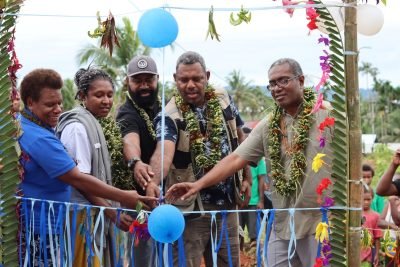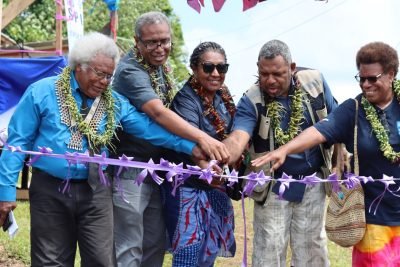Two Solar Hybrid Power Systems Inaugurated in Southern Malaita Province
Access to electricity in rural areas of Solomon Islands is a widespread issue faced by most communities living in parts of the country.
The Stimulating Progress Towards Improved Rural Electrification in Solomon Islands (SPIRES) project implemented through UNDP by the Ministry of Mines, Energy and Rural Electrification (MMERE) aims to promote electricity for rural communities through renewable energy.
As part of the SPIRES project, both institutions have partnered with the Ministry of Environment, Climate Change, Disaster Management and Meteorology (MECDM) for the installation of two solar hybrid power systems that were inaugurated on 6th and 7th October at Rokera Provincial Secondary School, and Hunanawa Community in East Are ‘are, both in the southern part of Malaita.
The first launching – on 6th October at Rokera Provincial Secondary School, counted with the presence of Hon. Peter Kenilorea Jnr , Member of Parliament for East Are’are, and representatives from the ministries, the provincial government, the energy sector and UNDP.

Picture 1: Ribbon cutting for Hunanawa Community, left to right UNDP Rep Ms. Vini Talai, Spires PM Ms. Judith Reynolds, MECDM rep Barnabas Bago, MMERE P.S Dr. Chris Vehe and Hon for East Are ‘are Mr. Junior Peter Kenilorea. Photo: SPIRES Media
It was organized aligning with the school’s graduation – bringing together officials, staff, students, parents and guardians, and people from nearby villages. They witnessed for the first time the functioning of the 36kWp solar PV hybrid system. This system will help the school switch from diesel generator-sets to solar power, a more reliable source of energy that will electrify the school 24hrs a day.
In his remarks Hon. Peter Kenilorea Jnr affirmed: “Education combined with electricity are the two most powerful tools for development that the world has ever seen. Scientists around the world agree that for the past 200 hundred years the biggest invention has been electricity.”
The school principle expressed his gratitude towards the Project, Ministry and UNDP for selecting Rokera to be one of few Schools chosen to benefit from this development to save costs and contribute to GHG Reductions.
This is a pilot initiative but it is a great example for all schools located in rural areas of Solomon Islands to get inspired and benefit from such development in the near future.
Permanent Secretary of the Ministry of Mines, Dr. Chris Vehe stated in his remarks that, “The increasing usage of fossil fuels has been replaced with a more sustainable energy, a huge savings in the reduction of purchasing diesel and redirecting the amount spent to improving the quality of education can be utilized for the school.”
After Rokera, the community of Hunanawa in East Are’are and nearby villages also witnessed the official launch of their solar hybrid system. The 30kWp solar PV system is connected to a battery bank that has the power to supply electricity for more than 100 houses – 50 of them alone within the Hunanawa community.
The Honorable Minister for East Are’are graced Hunanawa Community with his presence stating that a community working together is vital in such developments in order to maintain the operation of the system for 5 – 10 years to come.
He also acknowledged the cooperation of the community for working together with SPIRES Project and the Ministry for the successful completion of the Solar Hybrid System Installation.

Photo caption – Ribbon Cutting of the Solar Hybrid PV System in Rokera Provincial Secondary School left to right Principle Mr. Robert Solomon, Hon Junior Peter Kenilorea, Spires PM Ms. Judith Reynolds, MMERE P.S Dr. Chris Vehe and UNDP rep Ms. Vini Talai. Photo: SPIRES Media
The Committee Chairman of the Solar PV system expresses his sincere acknowledgement towards the project and to MMERE, UNDP, the funding agency GEF, other Ministry partners and stakeholders who initiated and implemented the project.
Solar hybrid systems are examples of renewable energy, cutting down the use of fossil fuel, prioritizing the consumption of solar power and therefore reducing greenhouse gas emissions, which is the SPIRES projects main objective.
The project helps Solomon Islands as country that is vulnerable to global warming to face and mitigate the climate crisis.
According to UNDP Representative Ms. Vini Talai, villagers can now use electricity to stimulate economic growth in their communities by switching from using manual sewing machines to electric sewing machines, and other electrical products.
One of the main challenges of solar hybrid systems is the technical maintenance of the system by the community. As part of the project, SPIRES will make sure equipment is monitored and maintained and will assist the school and the community – through capacity building – to integrate a financial mechanism towards looking after the system before the work is handed over to the MMERE/Energy Division.
Dr. Vehe said the Ministry is working to design a renewable energy policy that can be implemented throughout the Solomon Islands. Hunanawa is the first community to implement the MMERE-developed renewable energy plan.
Hunanawa can teach us about responsibility and how to implement this plan so that it is appropriate for the entire country. Women and young people in positions of leadership are crucial to the development of a national strategy for renewable energy.
This is a big step forward for Solomon Islands in the path of renewable energy with a specially positive outcome for rural areas. It paves the way for the Government of Solomon towards a more comprehensive renewable energy strategy and policy, and a big economic boost for both community and school.
The SPIRES project is being implemented by the Ministry of Mines, Energy & Rural Electrification under its Energy Division with financial support from the Global Environmental Facility through the UN Development Programme.
ENDS//
– SPIRES PROJECT
